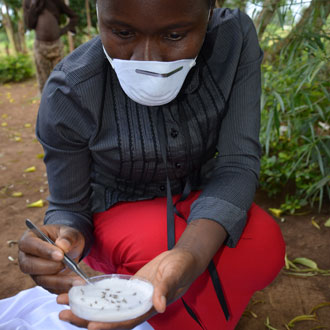Evidence-based research and routine monitoring are essential to sound malaria control programming. Understanding the behavior of the mosquitoes that carry malaria requires precise data on the vector’s density, feeding time, location, and its resistance to insecticides. Trained entomologists conduct the necessary research and apply that knowledge to crucial decision making in the deployment of malaria control interventions.
The Uganda IRS Project, financed by USAID/PMI and DFID/UK depends on a continuous flow of entomological data to ensure its effectiveness. The project is building the country’s entomological capacity by training vector control officers and IRS technicians on the skills and knowledge needed to carry out malaria vector monitoring and research and to ultimately contribute to combating malaria in the country.
Stella Nakigoonya is an IRS Insectary Technician from the Tororo Hospital insectary, established by the project. She said, “At school we only learned theory, but with this project we’ve had practical hands-on training. We learned what the vector looks like, how to rear the mosquitoes in an insectary, and more. It’s really interesting to see the theory put into practice.”
The training has enabled young technicians and entomologists to measure the quality of spraying and the residual efficacy of the insecticide. “We’ve learned so much from the Uganda IRS Project,” said David Onanyang, a Vector Control Officer from Soroti District, “including how to conduct bioassays, susceptibility testing, intensity studies, bionomics and more. We now have the capacity to monitor and survey on our own. The project has equipped us to sustain the work. We can definitely continue after the project. We know what to do.”
“The malaria rate has declined drastically with IRS,” he said. “We can measure the decline by the number of vectors in the house. Before IRS, in one house, we could find 200 mosquitoes through the pyrethrum spray catch. Now we find zero.”
By equipping the country with a cadre of entomology specialists, the Uganda IRS Project is helping to sustain the gains in reducing the malaria burden for the long-term.
USAID/DFID-funded Uganda Indoor Residual Spraying Project supports the President’s Malaria Initiative (PMI) to plan and implement the IRS program to reduce the burden of malaria through cost-effective commodity procurement and logistics systems, access to technical expertise, and implementation of IRS in selected districts in Northern and Eastern Uganda.

